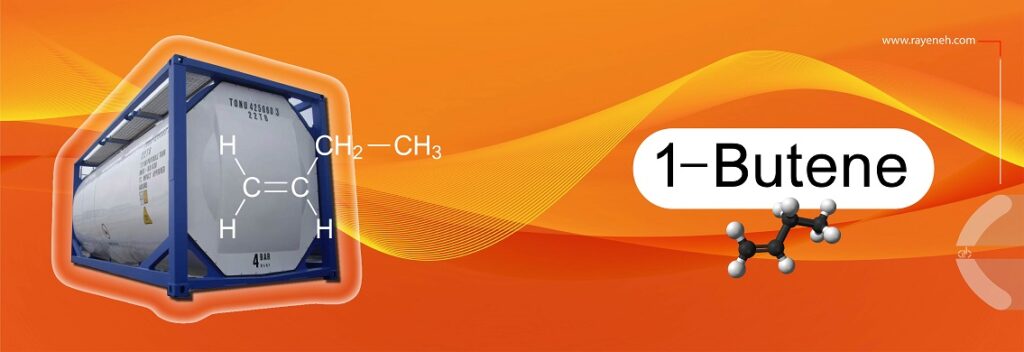1-Butene is a colorless, flammable gas that belongs to the family of alpha-olefins. It is an important building block for the production of various chemicals, including following items:
- Plastics
- Synthetic rubber
- Some specialty chemicals
The demand for 1-butene has been increasing in recent years due to the growth of these industries. This article provides an overview of 1-butene, its properties, production methods, applications, and market trends. Figure 1 shows the chemical structure of 1-butene.

Fig 1. The chemical structure of 1-butene
Properties of 1-Butene
1-Butene ( 1-Butylene) has a molecular formula of C4H8 and a molecular weight of 56.11 g/mol. It has a boiling point of -6.3°C and a melting point of -185.5°C.
It is soluble in organic solvents such as ethanol, ether, and benzene but insoluble in water. 1-Butene is highly flammable and can form explosive mixtures with air.
Production of 1-Butene
1-Butene is produced through various processes, including steam cracking of hydrocarbons, catalytic dehydration of butanol, and metathesis of propylene.
Steam cracking is the most common method for producing 1-butene. In this process, hydrocarbons such as naphtha or ethane are heated to high temperatures (800-900 °C) in the presence of steam. This breaks down the hydrocarbons into smaller molecules, including 1-butene.
Catalytic dehydration of butanol is another method for producing 1-butene. In this process, butanol is dehydrated in the presence of a catalyst to produce 1-butene.
Metathesis of propylene is a newer method for producing 1-butene. In this process, propylene is reacted with ethylene to produce a mixture of butenes, which can be separated to obtain pure 1-butene. Figure 2. shows the 1-butane process by Axens.

Fig 2. The 1-butane process by Axens
Major Producers of 1-Butene
ExxonMobil, Dow Chemical, Shell Chemicals, and LyondellBasell are the major producers of 1-butene in the world. ExxonMobil is one of the largest producers of 1-butene, with a production capacity of over 1 million metric tons per year.
Dow Chemical and Shell Chemicals also have significant production capacities for 1-butene. The other major manufacturer of 1-butene including following items:
- Chevron Phillips Chemicals
- Innovyne
- Shell Chemical
- Texas Petrochemical
- BP Chemicals
- Petrochemical Corporation of Singapore
- China National Petroleum Corporation
- PetroChina Company Limited
- ONGC
- Praxair
Applications of 1-Butene
1-Butene is an important building block for the production of various chemicals, including plastics, synthetic rubber, and other specialty chemicals.
Polyethylene is the largest application for 1-butene. Polyethylene is a versatile plastic that is used in various applications such as packaging, construction, and automotive industries.
1-Butene is used as a comonomer in the production of high-density polyethylene (HDPE) and linear low-density polyethylene (LLDPE).
Synthetic rubber is another major application for 1-butene. 1-Butene is used as a monomer in the production of polybutadiene rubber (PBR), which is used in tire manufacturing.
Other applications of 1-butene include the production of butene-1 oxide, which is used in the production of surfactants and detergents, and butene-1 dibromide, which is used as a flame retardant.
Market Trends
The demand for 1-butene is expected to grow in the coming years due to the growth of various industries such as packaging, construction, and automotive industries.
The increasing demand for polyethylene, synthetic rubber, and other specialty chemicals is expected to drive the growth of the 1-butene market.
Asia-Pacific is the largest market for 1-butene, accounting for more than half of the global demand. The increasing demand for plastics and synthetic rubber in countries such as China and India is expected to drive the growth of the 1-butene market in the region.
North America and Europe are also significant markets for 1-butene. The growth of the automotive and construction industries in these regions is expected to drive the demand for 1-butene in the coming years. Figure 3 shows the global butane-1 market and forecast demand to 2027.

Fig. 3 The global 1-Butene market and forecast demand to 2027
Conclusion
1-Butene is an important building block for the production of various chemicals, including plastics, synthetic rubber, and other specialty chemicals.
The demand for 1-butene is expected to grow in the coming years due to the growth of these industries. The major producers of 1-butene include ExxonMobil, Dow Chemical, Shell Chemicals, and LyondellBasell.
The increasing demand for polyethylene, synthetic rubber, and other specialty chemicals is expected to drive the growth of the 1-butene market.

